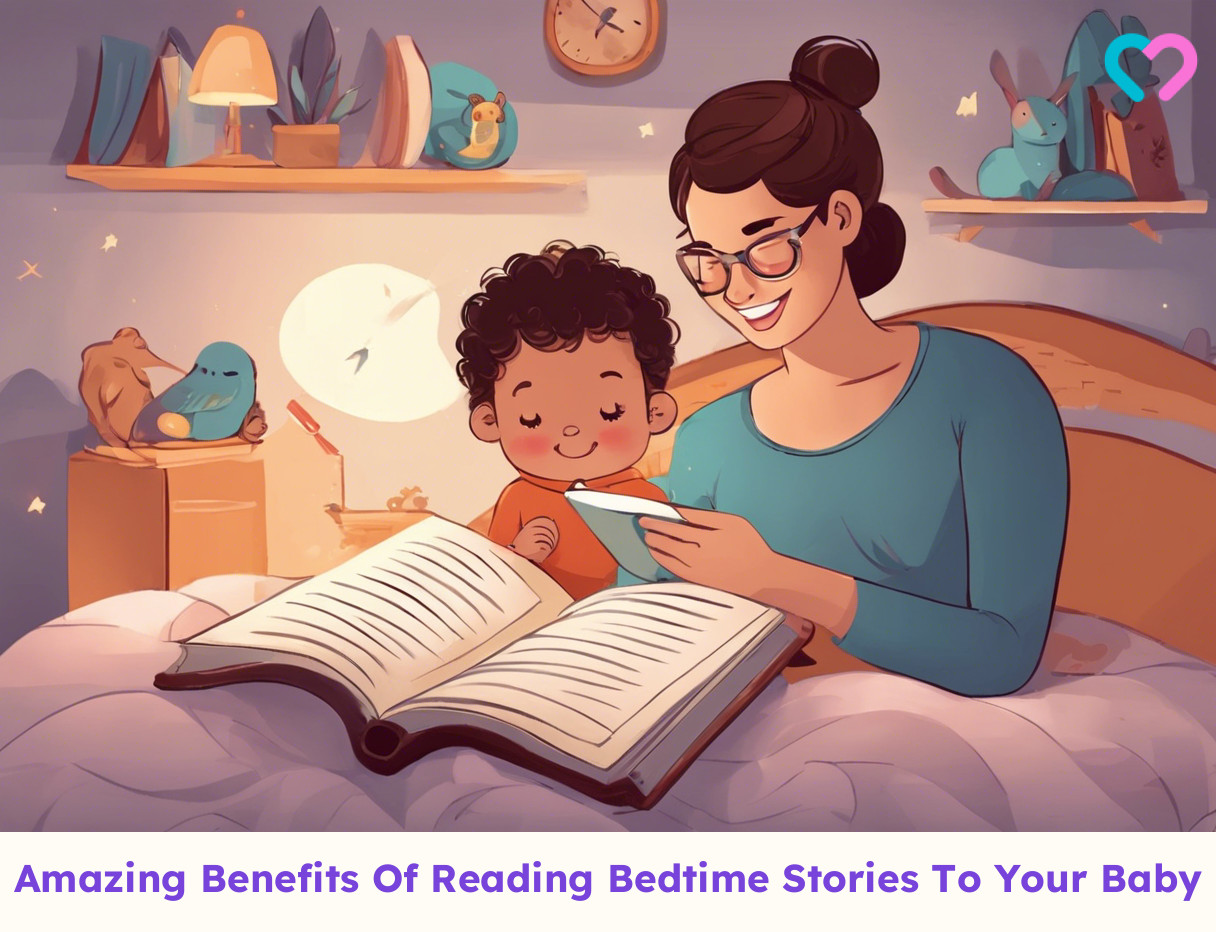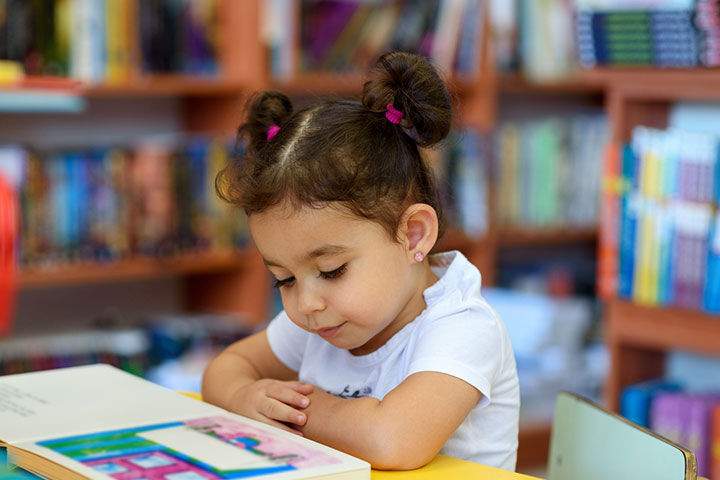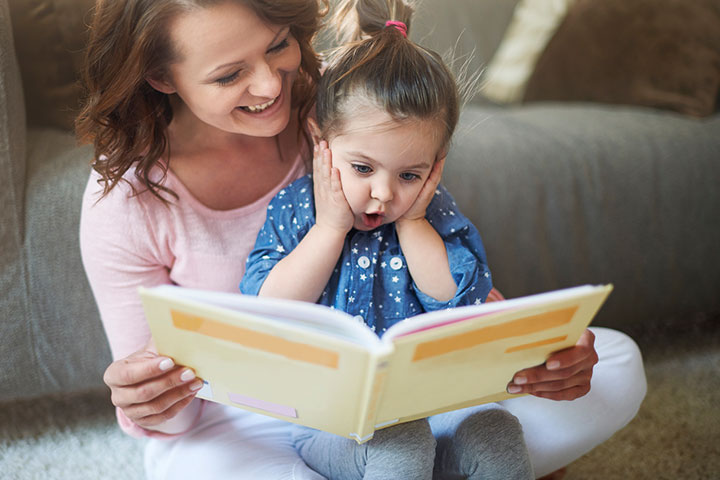
Image: Shutterstock
Telling bedtime stories to your little ones is beneficial in more than one way. For example, having a collection of bedtime storybooks for babies can not just help you put them to sleep quickly but also enhance their creative thinking abilities from a young age. Reid Lyon, the chief of child development and behavior branch from National Institute of Child Health and Human Development, Bethesda, said, “Neural research shows that when parents and caregivers interact verbally with children — which includes reading to them — kids learn a great deal more than we ever thought possible.” Altogether, narrating morally well-defined stories to your babies has proven benefits and could help instill moral values in them. Therefore, you may continue this practice for years. Read on as we tell you the advantages and age-appropriate ways and types of stories to read for your little ones.
When To Start Reading Bedtime Story Books For Babies?
Image: IStock
It is never too early to introduce your baby to the world of stories. Doctors suggest that you start reading them baby stories right from when they are infants to boost their imagination. In fact, you can make reading aloud a habit while you’re still pregnant, as babies recognize their mother’s voice in the womb.
Setting time aside to read stories every day is a good habit. The bedtime and naptime are the best times. Making reading a part of night time routine would help your baby calm down and understand that it’s time to sleep. Set the time somewhere between 6.30pm and 8.30pm. Any time after that can make your little one tired.
Benefits Of Reading Bedtime Stories To Babies
Reading to babies would help them process words faster later in life.
Bedtime stories are a great way to improve interaction between you and your baby. She will love staring at the colorful pictures and have a real good time listening to the fairy tales and fables. Here are numerous other benefits:
1. Develops communication
Image: IStock
Story reading helps in the development of your baby’s oral communication skills, listening abilities, memory, and language recognition skills. It is a good way to strengthen her vocabulary and different sentence structures from a very early age.
With time and age, your baby shall learn to communicate through body language, verbal methods, listening and written words just like you.
Babies would have heard all the sounds required to speak their native language by the time they turn one (1). The more you read, the more the little one is exposed to words.
2. Promotes social and emotional development
Illustrations and stories go hand in hand, and your baby can develop ideas about different toys, animals, birds and so on. You will find her use new words to think, feel and express her feelings.
 Did you know?
Did you know?3. Boosts cognitive skills
Image: IStock
Long before your baby has started speaking, she is absorbing information about the language by listening to the stories you read. This will certainly reap benefits when your child starts her education.
Babies around ten months can learn to turn pages and listen to new words. As your little one continues to grow, she would learn the art of reading from left to right. Babies, who are around a year old, and toddlers can develop their problem-solving skills by listening to bedtime stories.
4. Improves attention
Engaging your baby in bedtime stories is an excellent way to help her get comfortable with the reading habit. It is indeed a very useful and healthy habit. You can improve her attention skills by reading to her every night.
5. Relieves anxiety
It is a good way to relax her mind and body before going to bed. Even if she is overstimulated, story reading will help her get involved in an entirely different world and relieve from all the anxieties.
6. Improves personality and knowledge
Image: IStock
As your baby grows, she may start looking up for some people and draw inspiration from them. Reading time is the right time to influence the little one and teach them life lessons. This can improve her personality and knowledge.
7. Becomes a habit
When you make story-reading your little one’s routine, it becomes a habit and a part of her life. Gradually, reading becomes a pleasure, and you do not have to ask her to read after she grows up. Later in life, reading may open the door to writing.
8. Enhances reading skills
Bedtime stories are crucial in promoting and enhancing a child’s reading skills. Establishing a bedtime routine with storytelling lays the groundwork for their phonics, introduces them to new vocabulary, and improves their reading comprehension. Moreover, your involvement fosters your children’s enthusiasm for reading.
9. Helps lower stress levels
Sharing a bedtime story is a peaceful and comforting experience for you and your child. Reading can also induce physical relaxation, lowering heart rate and relieving muscle tension. According to a 2009 University of Sussex study, reading can decrease stress levels by as much as 68%, surpassing the effectiveness and speed of alternative relaxation methods like listening to music or enjoying a hot cup of tea (2).
Tips For Parents
Image: IStock
Do not make story reading monotonous to your baby and yourself. Keep it so interesting that she looks forward to this kind of bonding with you every day.
- Using different emotions and expressive sounds while reading the story fosters the social and emotional development of your baby.
- As you read, make your baby look and answer questions to promote social development and thinking skills.
- Let her imitate sounds, recognize pictures, and learn words.
- Read out with excitement, joy, and closeness. It helps them get associated with books.
- Cuddling while reading makes your baby feel connected, safe, and warm.
- Sing rhymes and make funny animal sounds.
- Don’t worry about reading the same story again and again. Babies love and learn from repetition.
- Turn off distractions like television or radio.
- If your baby seems sleepy, use a soothing and calming voice.
- By exaggerating the ‘oo’ sound in the moon and using words like hush, you can stimulate connections in the part of your baby’s brain that handles language sounds. The part is called the auditory cortex.
- Remember that the interaction with your baby is the key for making the most out of bed-time story-reading. This is one of the best ways for parent-child bonding.
 Point to consider
Point to considerWhat Type Of Stories Can You Read To Your Baby?
Any simple storytelling for baby with colorful illustrations will work. They influence the overall development of your baby. Pick simple short stories for babies related to their current stage in life, such as how a boy finds his lost toy or how a girl learned to use the potty seat.
Stories with right pictures would introduce your little one to different toys, animals, birds and more. Stories with small details such as the difference in color, shape, and size shall help her distinguish between the available options. So check for them.
Young babies may not identify the pictures, but they get attracted to different patterns and contrasting colors as their vision is still developing. Add stories with a moral in it, so that your baby can grasp those morals for her lifetime lessons.
10 Best Stories To Read Out For Babies
1. Good Night, Gorilla by Peggy Rathmann
There was a zoo full of animals like lion, deer, tiger, elephant, fox, rabbit, rhino and more. Every night the zookeeper makes nighttime rounds and goes back to his home. One day, the zookeeper finished his rounds and was on his way back to the home. Then a mischievous gorilla stole his keys and followed him. It released all the other animals from their cages one after the other. They followed the zookeeper and went into his house. The keeper’s wife discovered the naughty animals. She escorted them back to their beds. All the animals went back to bed.
2. The Runaway Bunny by Margaret Wise Brown, illustrated by Clement Hurd
There was a young bunny. One day, she felt insecure and threatened her mother to run away and become a rock. The mother feared a lot because she loved the little bunny to the core. She assured the little one that she will follow her wherever she goes. The unconditional love of the mother made the young bunny feel safe and secure. She happily went to bed, hugging her dear mommy!!
3. Good Night, Little Bear by Patsy Scarry; illustrated by Richard Scarry
Once there was a little bear who loved his father so much! Both of them enjoyed each other’s presence. They played together every evening after the father returned home. After supper, the father bear narrated a bedtime story to the little one. Following the bedtime story, the father would carry the little one on his shoulders and take him to bed. One day the baby bear had hidden somewhere. The father went on searching for the baby playfully saying, “Where could Little Bear be?” Father searched high and low – above the china cabinet, in the woodbox outside, under the stove to find him. Father could not find the little one. Finally, the little bear revealed himself when they pass by a mirror. The little bear goes to bed (believing that he had fooled his dad).
4. A Book of Sleep by Sung Na
When the sky grows dark,
And the moon glows bright,
Everyone goes to sleep . . .
Except for the watchful owl!
During a starry night, an owl was awake and watching all the other animals settle in for the night. It saw some animals sleep standing up and some others sleep on the move! It saw some sleep peacefully alone. Others sleep altogether. Each animal rests in its own way!
5. Goodnight Moon by Margaret Wise Brown and Clement Hurd
There was a little bunny that always behaved well and spoke politely. It was loved by everyone around. Every night before going the bed, the bunny says “goodnight” to everything around “Goodnight room. Goodnight moon. Goodnight cow jumping over the moon. Goodnight light, and the red balloon…”. The little bunny says goodnight to the rhyming objects in his room like the moon, the spoon, the brush, the bowl of mush, and the cow jumping over the moon. And finally, goes to bed.
6. Guess How Much I Love You by Sam McBratney and Anita Jeram
A little bunny is lovely and loves his mother very much. One day it wanted to express how big his love is for his mother. The parent bunny and the little bunny exchange statements with increasing expression of affection. As the contest ends, both of them glide into sleep.
7. Llama, Llama, Red Pajama by Anna Dewdney
It’s Baby Llama’s bedtime. But the little one is not quite ready to part with his mommy and go to bed. He wonders where she has gone and keeps worrying until she returns. Momma reassures that she’s “always near, even if she’s not right here”. This comforting message makes the little one fall into peaceful sleep.
8. Peace At Last by Jill Murphy
It is late in the night, and all are tiredly making their way to the bed. Even you are ready to fall asleep. But why is Mr. Bear unable to fall asleep? It is because the baby bear is still busy playing airplanes. And mommy bear is already going snore.. snore! Mr. Bear is wondering if he will ever get any peace!
9. Shark In The Park by Nick Sharratt
Timothy Pope keeps looking through his telescope now and then. Once he was looking into the park through the telescope, he saw a shark in the park. But how can that happen? Surely, that find could be just a cat or dad’s hair!
10. Monkey Puzzle by Julia Donaldson
Once a little monkey was separated from his mommy. He loved his mom and wanted to find her. He asked for help from a butterfly. The friendly butterfly agreed to help him. But butterfly did not know how the mommy monkey looked like. Every time the butterfly tried to match the monkey’s mother it failed. The silliness of the butterfly during each mismatch made us laugh.
Frequently Asked Questions
1. Does reading to babies help them sleep?
Listening to you read softly and in a rhythmic manner can soothe your baby, enabling them to fall asleep. It also offers you some alone time to cuddle with your infant at the end of the day, helping you develop a bond with them.
2. How do I read a baby’s bedtime story?
Babies of different ages require various story narration techniques to keep them engaged. Infants and babies younger than six months will be happy to simply listen to your voice, while six- to nine-month-old babies may appreciate picture books and board books with colorful illustrations. When reading to babies older than a year and toddlers, you can engage them by asking basic questions about the illustrations (3).
3. Are there any negative effects to reading bedtime stories to my baby?
Reading bedtime stories to your infant has many benefits for their growth, linguistic abilities, and relationship with you as a parent. However, it is important to remember that there can be some possible negatives, such as overstimulation brought on by dramatic narratives or the appearance of vivid images due to a lack of age-appropriate storytelling. Also, parents who are adopting ebooks or digital storytelling mediums might increase the child’s screen time and put a strain on their eyes.
Reading bedtime stories is a good practice that enhances your and your baby’s interaction. Besides, it helps in their socio-emotional and cognitive development. So narrate stories to your baby by using different emotions and expressive sounds. Show them colorful images and let them imitate sounds. Talk to them, explain the story, and sing songs, nursery rhymes, or lullabies to have some fun. Snuggle up to your baby and include loads of cuddles, hugs, and kisses to make the baby feel warm, safe, cozy, and connected with you. So go ahead and make it a habit.
Infographic: Tips For Parents On Reading Bedtime Stories To A Baby
Reading bedtime stories to your little one not only helps to put them to sleep but also helps parents to bond with them. However, keeping your baby engaged when reading a story can be challenging. Therefore, we provided valuable tips in the infographic below to help make your baby’s bedtime story session engaging and fun.

Illustration: Momjunction Design Team
Key Pointers
- Begin reading to babies early, even when they’re in the womb.
- Reading aloud develops oral communication, listening, memory, and language recognition skills.
- Bedtime stories improve parent-baby interaction and foster social and emotional skills.
- Story reading promotes cognitive development and problem-solving abilities in babies.
- Make reading engaging by using emotions, expressive sounds, asking questions, and cuddling.

Image: Stable Diffusion/MomJunction Design Team
Health Sutra brings you key benefits that go beyond imagination and bonding. Learn how this simple tradition nurtures imagination and builds emotional connections and cognitive skills for your child’s brighter future.
References
- Bonnie B. Armbruster et al.; (2003); A Child Becomes a Reader Birth through Preschool.
https://lincs.ed.gov/publications/html/parent_guides/birth_to_pre.html - Reading for stress relief.
https://www.takingcharge.csh.umn.edu/reading-stress-relief - Read Early and Often
https://www.zerotothree.org/resource/read-early-and-often























